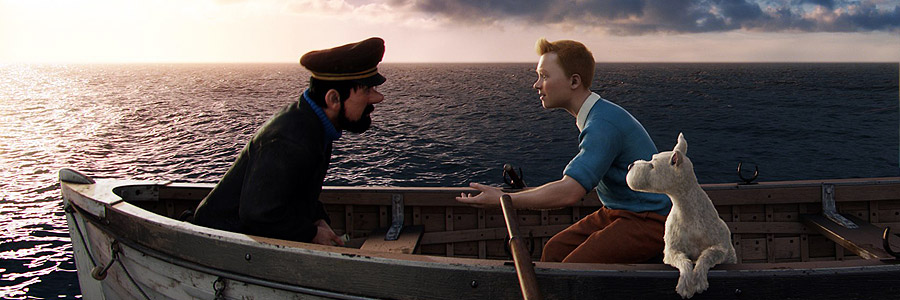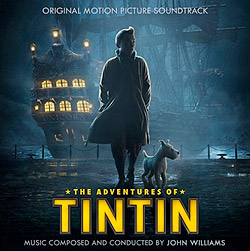
The Adventures Of Tintin

THE ADVENTURES OF TINTIN (CD)
Sony Music
Release date: October 24th, 2011
Running time: 65:39 minutes
Composer: John Williams
I was never really a big fan of the Tintin cartoons when I was younger, however when I heard that John Williams was composing the score for The Adventures of Tintin – The Secret of the Unicorn, I knew I would at least be listening to the soundtrack, even if I didn’t watch the film.
Directed by long-term working companion of Williams, Steven Spielberg, The Adventures of Tintin – The Secret of the Unicorn begins with young journalist Tintin (voiced by Jamie Bell) and his dog, Snowy, buying a model of a three masted ship, the Unicorn, from a European market.
Tintin is then approached by two men who both wish to purchase the model boat from him. He refuses the offer, and proceeds home with his purchase. That evening, during a fight between Snowy and the neighbour’s cat, the model is broken, revealing a rolled up parchment scroll which falls from the wreckage. Tintin is unaware of this; however Snowy has seen the scroll. Upon his later travels, Tintin realises that there are two model ships.

As the plot thickens, Tintin is later captured and imprisoned on a ship called the SS Karaboudjan. Here he meets the ever drunk nominal Captain, Haddock (voiced by Andy Serkis), who never appears to know anything that is happening around him. Eventually, the pair, along with Snowy, manage to escape the ship on a lifeboat. This leads to a game of cat and mouse, ending with Tintin capturing a search plane which proceeds to crash into the desert.
Dehydrated and without a drop of alcohol left in his system, Haddock begins to hallucinate, and starts to remember the stories about his ancestor, the captain of the ship named Unicorn. You can guess really where it goes from here – it is the usual story of findong maps and the search for treasure. The film also includes voiceovers from Daniel Craig and Simon Pegg.
The soundtrack is reminiscent to the Indiana Jones scores. It is adventurous and mysterious. The opening track, The Adventures of Tintin, is a playful call and response combination of harpsichord, woodwind, muted brass, accordion and double bass. Rhythmically, it consists of syncopated, often chromatic motifs over a walking bass line.
- 1. The Adventures of Tintin
- 2. Snowy’s Theme
- 3. The Secret of the Scrolls
- 4. Introducing the Thompsons and Snowy’s Chase
- 5. Marlinspike Hall
- 6. Escape from the Karaboudjan
- 7. Sir Francis and the Unicorn
- 8. Captain Haddock Takes the Oars
- 9. Red Rackham’s Curse and the Treasure
- 10. Capturing Mr. Silk
- 11. The Flight to Bagghar
- 12. The Milanese Nightingale
- 13. Presenting Bianca Castafiore
- 14. The Pursuit of the Falcon
- 15. The Captain’s Counsel
- 16. The Clash of the Cranes
- 17. The Return to Marlinspike Hall and Finale
- 18. The Adventure Continues
The scene for the film is set through the combination of traditional instruments chosen by Williams, creating an ‘at sea’ theme. There is an establishment of a partial theme, which is developed further later in the score in The Clash of the Cranes. This track didn’t strike me as typical Williams at first listen, however the following track, Snowy’s Theme, soon established that this was a John Williams score.
The rising string motifs and distinctive jumping intervals of the melody remind me of the theme to E.T The Extra-Terestrial (1982), whilst still incorporating the syncopated melodic theme from the first track accompanied by pizicatto strings. The opening melody of The Secret of the Scrolls reminds me of the theme from Harry Potter (2001) for which Williams also composed the original score. It is a fairly sinister melody, distinguished by the use of minor chords. It is a fairly memorable melodic theme.
Marlinspike Hall is a track full of anticipation and mystery, created through the use of tremelo strings, and low string melodies combined with dischordal brass. Sir Francis and the Unicorn sees the return of the melody from The Secret of the Scrolls – one of the main themes of the score has now firmly been established. Half way through, the theme becomes more driven, with percussion and the return of the call and response technique, with the main theme being passed between woodwind, strings and brass.
Red Rackham’s Curse and the Treasure is almost a variation of the main theme, with short sections of it appearing, although slightly altered melodically, throughout. This is the longest track at 6:11 in length. Capturing Mr. Silk turns into a much more playful piece, through the use of a whimsical combination of instrumentation including accordion and a mischievous clarinet melody.

Presenting Bianca Castafiore features the vocal talents of American Soprano Renee Fleming and is Williams adaptation of Joachino Rossini’s The Barber of Seville and Charles Gounod’s Je Veux Vivre from Romeo et Juliette. This track worked really well until the high note at the end, accompanied by the sound of cracking then shattering glass, which spoiled the whole mood of the track – this sound effect may have well worked in the film, but should have been left out of the soundtrack.
An extension of Je Veux Vivre continues into the beginning of The Pursuit of the Falcon. The Return to Marlinspike Hall and Finale sees the recapitulation of the theme from earlier, however this time in a much more joyous and playful way, before diminishing again into a much darker version of events, displaying anticipation and setting the scene for further adventures leading into the final track, The Adventure Continues.
Overall, this was a pretty decent effort from Williams. Although it does not display anything different or new stylistically, there is a splash of development from earlier scores such as Hook (1991) and Jurassic Park (1993). The melodies and orchestration are more complex musically yet less memorable thematically. I was unsure when I first began listening to this score, but yet again Williams has won me over.
The rhythmic flow of the score keeps you gripped throughout, and although it may not tug at the heartstrings as much as William’s previous compositions, it does what it is intended to do – create the feeling of adventure. At times it does seem like a never-ending frenzy of musical mayhem, but it is still John Williams at his best.

Phil Blanckley
Phil is a 27-year-old classically trained musician from Sheffield with qualifications in Popular Music, Classical Music and a BA (Hons) in Creative Music Technology and Sound Recording. He likes nothing better than locking himself in the studio and composing music of all genres.
Phil became interested in composing after learning how to play the Cello and Clarinet at a young age, and has never looked back since. His favourite composer is Danny Elfman, whose unconventional harmonies and rhythms in scores such as Edward Scissorhands still manage to bring a tear or two to his eye.
You can find him on Twitter @PhilBlanckley.
© 2022 STATIC MASS EMPORIUM . All Rights Reserved. Powered by METATEMPUS | creative.timeless.personal. | DISCLAIMER, TERMS & CONDITIONS
HOME | ABOUT | CONTACT | TWITTER | GOOGLE+ | FACEBOOK | TUMBLR | YOUTUBE | RSS FEED
CINEMA REVIEWS | BLU-RAY & DVD | THE EMPORIUM | DOCUMENTARIES | WORLD CINEMA | CULT MOVIES | INDIAN CINEMA | EARLY CINEMA
MOVIE CLASSICS | DECONSTRUCTING CINEMA | SOUNDTRACKS | INTERVIEWS | THE DIRECTOR’S CHAIR | JAPANESE CINEMA





